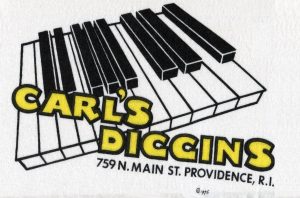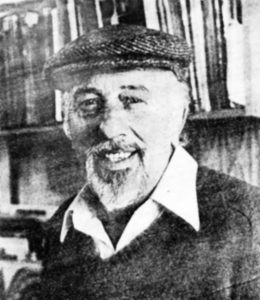Carl Henry
2016 INDUCTEE
Disc Jockey, Producer
CARL HENRY (1920-1986)
by Allan “Big Al” Pavlow
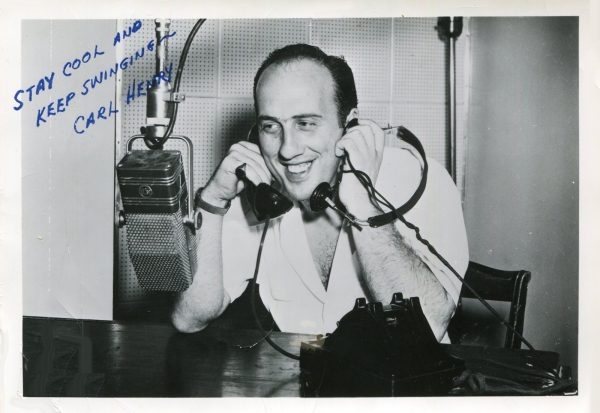 Carl Henry (nee Henry Schiavino) was born in Providence and was the disc jockey who introduced Rhode Islanders to the sounds of Rock ’n’ Roll in the 1950s. From 1952 until the end of the decade, his radio shows on WRIB and WPAW exposed the “hidden sounds” of Rhythm & Blues to everyone who cared to listen, but it wasn’t until the mid-1950s that Caucasian teenagers glommed onto him with a passion. He was a true Rock ’n’ Roll pioneer. His Providence record shop, Carl’s Diggins House of Jazz & Soul (originally adjacent to the Celebrity Club in Randall Square then later in several locations on North Main Street), was open from 1952 to 1985 and was the hot spot to find those great discs. He was also a concert promoter (he brought The Rolling Stones to the Loew’s State Theatre in Providence in 1964) and was a lifelong jazz aficionado and champion of jazz musicians. Cleveland and New York City had Alan Freed, Buffalo had George “The Hound” Lorenz and Rhode Island had Carl Henry!
Carl Henry (nee Henry Schiavino) was born in Providence and was the disc jockey who introduced Rhode Islanders to the sounds of Rock ’n’ Roll in the 1950s. From 1952 until the end of the decade, his radio shows on WRIB and WPAW exposed the “hidden sounds” of Rhythm & Blues to everyone who cared to listen, but it wasn’t until the mid-1950s that Caucasian teenagers glommed onto him with a passion. He was a true Rock ’n’ Roll pioneer. His Providence record shop, Carl’s Diggins House of Jazz & Soul (originally adjacent to the Celebrity Club in Randall Square then later in several locations on North Main Street), was open from 1952 to 1985 and was the hot spot to find those great discs. He was also a concert promoter (he brought The Rolling Stones to the Loew’s State Theatre in Providence in 1964) and was a lifelong jazz aficionado and champion of jazz musicians. Cleveland and New York City had Alan Freed, Buffalo had George “The Hound” Lorenz and Rhode Island had Carl Henry!
CARL HENRY OBITUARY
The Providence Journal
April 1, 1986
Carl Henry, 66, jazz aficionado and disk jockey who was a longtime fixture on Rhode Island radio stations and owner of Carl’s Diggins record shop on North Main Street, died yesterday at Miriam Hospital. He was the husband of artist Anne Kolb Henry .
His real name was Henry Schiavino, but he adopted the name Carl Henry in the 1940s when he took his first job as a radio disk jockey with WFCI, Pawtucket, and the name stuck.
He recalled with pride that he was the first disk jockey in the state to regularly play Rhythm & Blues (later Rock ‘n’ Roll), which then, in 1951, was under attack as being obscene and immoral. He was accused in editorials by The Providence Visitor, the Catholic diocesan newspaper, of playing songs with dirty lyrics on his R&B show on station WRIB, but the station continued to carry the show and fully supported his stance.
Born in Providence, a son of the late Charles and Angelina (Scetta) Schiavino, he grew up in Pawtucket.
He recalled that as the master of ceremonies of a junior high school function he gave a flattering introduction to the principal, who then suggested that the youth’s sonorous voice was well suited for radio. “I hadn’t given it a thought until then,” Mr. Henry recalled, “but after that I sure did.”
His first job in radio was while he was an Army staff sergeant during World War II, and was a member of a crew that built and operated a base radio station at Carlsbad, N.M. After the war, he returned to Rhode Island and worked for a year with WFCI, then worked for a year with WPDQ, Jacksonville, Fla.
He returned to Rhode Island in 1947, and for another year worked as a disk jockey with the state’s first FM station, WLIB, and later worked for WPJB. “But the money wasn’t too good in those days,” he once recalled, so he left radio, thinking that the departure was permanent.
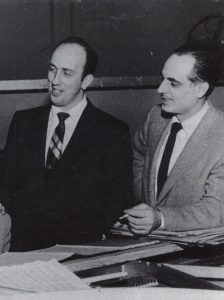
Carl Henry and band leader Ray Belaire, owner of The Arcadia Ballroom in downtown Providence, backstage preparing for a show. Carl was a fixture at the venue in the late 1940s and early ’50s helping to put together bills, acting as MC and helping promote the ballroom during his radio broadcasts. (Duke Belaire Archive)
However, a friend at WRIB went on vacation in 1950, and Mr. Henry agreed to fill in for him, only because the stint would included a couple of remote broadcasts of jazz from the Celebrity Club at Randall Square. Mr. Henry ‘s enthusiasm for jazz was such that when the friend returned, Mr. Henry was ensconced and continued the remote broadcasts from the nightclub. That, he recalled, was the real beginning of his lifelong radio career.
Mr. Henry once opined that jazz aficionados make up about 5 percent of the population, “…just about enough to keep it from becoming too commercial.” However, he discerned shortly after he began the broadcasts from the Celebrity Club, the small public demand meant that few record stores sold the kinds of records he was playing for his listeners. And that prompted him in 1953 to open Carl ‘s Diggins next door to the Celebrity Club. Between sets at the club, the musicians – Billy Holiday, Charlie Parker, John Coltrane – would wander over to the record shop to swap stories or listen to new records of other jazz world greats.
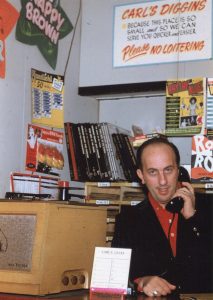
Carl Henry behind the counter at the original Carl’s Diggins shop adjacent to The Celebrity Club. (Schiavino Family Archive)
Mr. Henry also was a promoter for a while, bringing to Providence artists such as Diana Ross & The Supremes, The Beach Boys and, in 1964, The Rolling Stones. The Stones, Mr. Henry once recalled, appeared at Loew’s Theater for a total cost of $3,500 in what he called “…the Ice Age of rock promotion.”
In 1961, he was one of a group of local business men that promoted that year’s Newport Jazz Festival. (After the “beer riots” of 1960, George Wein’s official Newport Jazz Festival had been banned by the city. This was an alternative festival billed as “Music At Newport” produced in cooperation with promoter Sid Bernstein. Wein’s festival returned in 1962. Ed.) In 1964 he was a founder and first chairman of the Society for the Preservation and Promotion of Jazz. His last regular radio program was “Designs in Jazz,” broadcast by WJAR in 1979.
CARL HENRY, BLUES-JAZZ ENTHUSIAST, IS REMEMBERED
Mike Boehm, Journal-Bulletin Arts Writer
The Providence Journal
April 3, 1986
Musicians leave behind their recordings and performances when they die, and they’re remembered. Carl Henry, who died Monday at 66, wasn’t a performer, but he was an influence whose impact was felt and appreciated by Rhode Island musicians who picked up on his enthusiasm for jazz and blues.
“He was the kind of guy who was encouraging to a lot of local people,” said bluesman Paul Geremia, a one-time folkie who learned a good deal about the blues by stopping in to chat and listen at Carl’s Diggins, the record store Henry ran in Providence from 1953 until his death. “He was sort of a reference point for a lot of people. I always felt that stopping by and shooting the breeze was like touching base.”
Duke Robillard lived around the corner from Carl’s Diggins when his band, Roomful of Blues, was expanding from a stripped-down format to the miniature big band horn sound that became its signature.
“He was instrumental in helping me find material” for Roomful, Robillard said. “A lot of the stuff we played and were influenced by was from 78s from Carl’s collection.”
There are no doubt thousands of other people, musicians and fans alike, who got their introduction to music they love at Henry ‘s shop or through his jazz broadcasts on radio. That’s an impressive legacy for anyone to leave. In an era when music is more and more a commodity for those who sell and broadcast it, and less and less a passion, Carl Henry is someone to remember with special respect.
